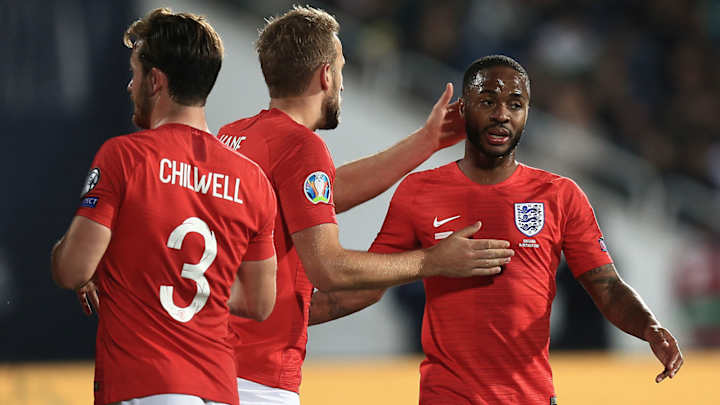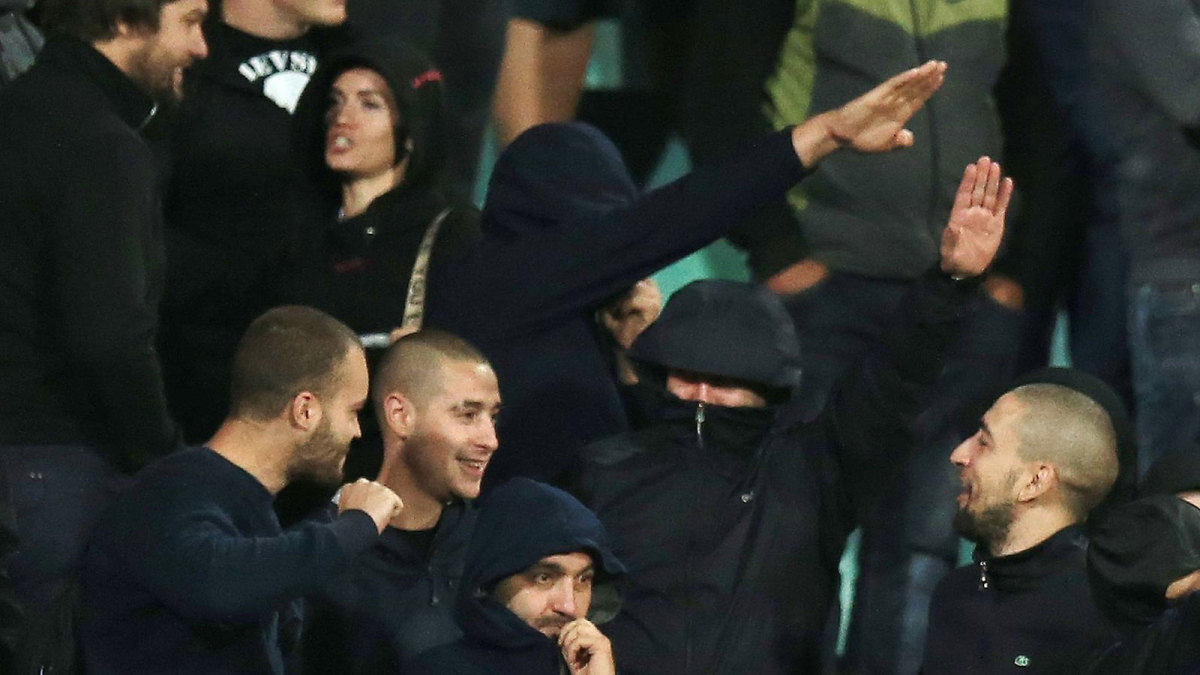England Progress Secondary, Its Fortitude Admirable Under Racist Attacks in Bulgaria


Football wasn’t really the focus in Sofia, Bulgaria, on Monday. England, after its wobble at the Czech Republic on Friday, produced an authoritative performance to beat Bulgaria, 6-0, but of far more significance was the fact that chanting by the home fans twice caused the game to be paused under UEFA's anti-racism protocol. The third step would have been the abandonment of the game.
Two large sections of the Vasil Levski Stadium were already half-closed as punishment for previous racist offenses. That didn't prevent the president of the Bulgarian Football Union, Borislav Mihaylov, and the national coach, Krassimir Balakov, from both denying their country had a problem. It didn’t take long, though, for monkey chants to be audible when Raheem Sterling and Tyrone Mings, in particular, were in possession.
The abuse seemed largely, although not exclusively, to come from a group of a several dozen fans, many of whom were dressed in black and wore scarves across their faces. A number held up T-shirts bearing the UEFA logo and the slogan “No Respect”–presumably a protest about the partial stadium ban–while there were also a number of arms raised in Nazi salute.

After the referee had stopped the game for the second time shortly before the interval, a large number of those fans left the stadium. Bulgaria captain Ivelin Popov addressed home fans at halftime, and, while the abuse certainly wasn’t entirely eradicated, it was notably reduced in the second half.
In the circumstances, the football felt largely irrelevant, although it is greatly to England’s credit that it remained so calm and professional in the circumstances. What the night actually means in terms of England’s capacity to potentially win the Euros next summer is harder to say.
Not an easy situation to play in and not one which should be happening in 2019. Proud we rose above it to take three points but this needs stamping out. pic.twitter.com/jTnUGOa8z2
— Marcus Rashford (@MarcusRashford) October 14, 2019
Feeling sorry for Bulgaria to be represented by such idiots in their stadium. Anyway.. 6-0 and we go back home, at least we did our job. Safe travel to our fans, u guys did well 🤟🏾❤️
— Raheem Sterling (@sterling7) October 14, 2019
The reaction to the defeat to the Czech Republic, as it so often is with England, was faintly ludicrous. England did not play well in Prague–its first loss in any qualifier in 43 matches–that much was clear. The defense looked worryingly vulnerable, as it had in the 5-3 win over Kosovo last month. The midfield, put under pressure, creaked alarmingly. But the idea that three years of progress under Gareth Southgate was suddenly invalidated was absurd.
The issue, really, had been the switch of shape to a 4-2-3-1, which made very little sense. The logic seemed to be that moving away from the 4-3-3 allowed the introduction of a playmaker but nobody stopped to ask why England needed to do that. It has become extremely adept in recent months at sweeping aside lesser opposition with the 4-3-3– no need for an additional playmaker there. Against better opposition, England’s problem has been a lack of control; that is not going to be improved by adding another creator at the expense of a deeper lying midfielder.
Perhaps in making the change against the Czech Republic there was an element of complacency. The Czechs were never likely to be as compliant as they had been in losing 5-0 at Wembley. And perhaps there was also an issue of execution: Mason Mount was presumably not supposed to play as high as he did in the first half, leaving Declan Rice and Jordan Henderson overmanned in midfield.
Whether lessons actually have been learned will be clearer next month when England goes to Kosovo. Bulgaria, although marginally less supine than it had been at Wembley, is a poor side and offered next to no resistance. But still, back in the 4-3-3 England looked more assured and was thoroughly professional despite the hugely difficult circumstances.
Southgate can also draw succor from the way his changes all had a positive impact. Marcus Rashford, again looking a different player to the weary under-pressure figure he cuts for Manchester United, scored the first goal, tormenting the Bulgarian defense with a rapid dribble before lashing in a shot from a narrow angle.
That'll do, Marcus. That'll do. 👀
— SI Soccer (@si_soccer) October 14, 2019
(via @ESPNFC) pic.twitter.com/GfZhyYLgJd
Ross Barkley, restored as the most advanced midfielder, got two with well-timed runs into the box. Harry Winks, although under little pressure at the back of midfield, helped England retain possession. Ben Chilwell’s pace helped him dominate the left flank. Mings, on debut, looked commanding, although he will have fewer easier nights from a football point of view.
It was another impressive night for Sterling, who has now scored 10 goals in his last 10 international matches, which perhaps should give pause for thought to those who would have England return to the back three it used at the World Cup; all those 10 have come from a wide position in a 4-3-3.
A win or draw in either of its final two games, at home vs. Montenegro and at Kosovo, would be enough to ensure England’s progress to next summer’s competition. Only Belgium has scored more goals than England in qualifying (although Roberto Martinez’s side has played two more games). Despite Friday’s defeat, this should remain a very straightforward qualification.
But Monday wasn’t really about that. The best that can be said is that the application of UEFA's protocol, on this occasion, appeared to work. Whether it's a deterrent from future instances, however, remains dubious at best.
